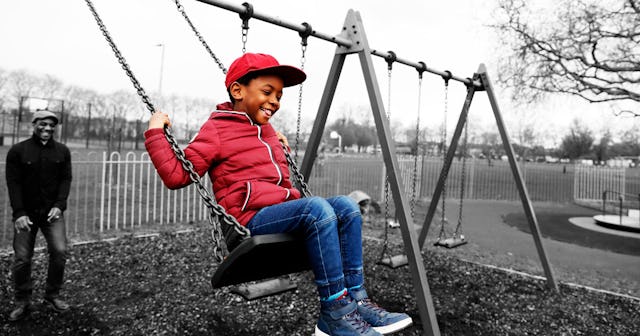My Kids Can't Enjoy The Same Freedom As Their White Peers

It gets me EVERY time. That parent on the playground who looks at my twin daughters, who, like their child, are simply enjoying themselves on the playground. My partner and I have heard more times than we care to talk about this phrase: “Your kids are so well behaved,” from a lone white parent. And as a Black mom, there is only one way to take this comment — offensively.
Usually my wife, who is South Asian American, is the one on the playground with our kids when this happens. I get the story secondhand, and still my blood boils when I hear it. It’s like my kids are expected to misbehave, like it’s a surprise when they don’t. Which is why the term “free range children” can never apply to BIPOC. Their skin color could be cause enough for comments like the one my children have received — or much, much worse.
BIPOC kids don’t get enough opportunities to simply be in the world, because of a fear for their lives, literally. The parents of BIPOC children cannot simply let their kids play on the playground alone without being there. And most teenage boys who are Black and brown cannot congregate in groups (especially not with hoodies on) without being deemed thugs or hoodlums or criminals of some sort.
I am by no means a helicopter parent, the one hovering over my kids all of the time, but I am hyper-aware of our surroundings. I do set limitations for my kids; I need to be able to see them when we are out in public, when they are playing on the playground. As for my 14-year-old son, I need to know where he is every second of the day. It isn’t because I don’t trust them, but because I don’t trust other people to respect my kids, to keep them safe, to allow them to be kids without forcing their beliefs on them about who or what they should be doing because they’re Black and brown kids. There used to be a philosophy that it takes a village to raise kids. I still believe this, but what happens when some people in that village don’t have the same standards for all kids within that community?
There is a fine line that I, as a mom of color, need to walk with my kids between letting them be kids like their white friends and protecting the well-being of our South Asian and Black family. Allowing our kids to go to the corner store to grab a forgotten item or to go and hang out with their friends on the town green could scar them for life, or worse, get them killed.
MoMo Productions/Getty
BIPOC families must all navigate the world differently than our white friends; this is not new. Diane L. Redleaf, author of “They Took the Kids Last Night: How the Child Protection System Puts Families at Risk,” shares, “Over long years of advocacy for families of color, poor families and immigrants, I have seen attention paid to the importance of giving white children freedom to play outside and learn to resolve their own problems. Children of color are not given the same freedom or attention.”
Our kid wearing a hoodie doesn’t translate the same as when a white kid wears a hoodie. Our kids simply riding their bikes together on a summer day, weaving their way along in their own neighborhood, could mean they get arrested for whatever, for no cause at all. There is a fear of letting my kids simply be kids, stunting their ability to just play freely, to form an independence without their parents in tow. I try to quiet this fear, but it is still lurking in the background when I let my kids out to play on our street in our white neighborhood.
San Francisco Bay Area mom Sharon Ng, a multicultural educator and mom of two, shares, “While I identify as Chinese and my husband identifies as White Latino American — our kids identify as part Chinese, part Brooklyn (where they were born), 100% sassy! They are not half Chinese or half white; they are whole kids, and we never expect them to choose an affinity, but to choose themselves!”
Sharon’s kids, like so many other BIPOC kids, learn life skills about how to be in the world mostly by how and what they are taught at home. Sharon goes on to say, “In order for all our kids to feel safe, we need racial solidarity between communities. It’s so important we understand this is not a zero-sum situation. It’s not the ‘oppression Olympics.’ But we have to do this together. We are stronger together.” These are strategies we can use, as Sharon points out, to help make our kids safer and more independent.
So, while there are parents out there who have no fear sending their kids out to play, or to apply for a job, or to run an errand, that has never existed in the same way for BIPOC parents. It’s a fear we push through with each passing day — and we must, because doing so teaches people that we deserve to live our lives too, free of fear and full of equality.
This article was originally published on